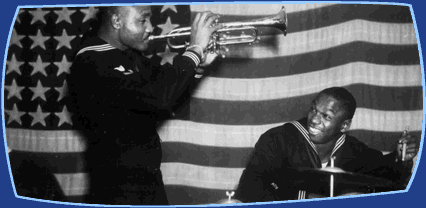
|

|


Armed Forces Band, World War II - Courtesy The National Archives
During 1939-1945, many jazz musicians were drafted to fight in World War II. Big dance bands had difficulties finding musicians. In the United States, there were war restrictions on the use of plastics and gasoline. Fewer records were produced to conserve plastic, and gasoline cutbacks made it difficult for bands to travel. African American jazz bands continued to face racial discrimination by the record industry, clubs and audiences. White jazz bands had financial success, while talented black entertainers were often overlooked.
A million African Americans would serve in the armed forces -- nearly half a
million overseas -- all on a basis of strict segregation (the unfair practice
of keeping blacks and whites separate). Even blood supplies for saving the
lives of the wounded were carefully separated by race. During the war years,
there were bloody confrontations between black and white troops at military
bases all across the country. Off-base, black soldiers were harassed,
beaten, barred from buses and even from restaurants where German prisoners of
war were allowed to eat. Many African Americans began a "Double V" campaign
- fighting for victory over tyranny abroad and discrimination at home.

|

|

|






